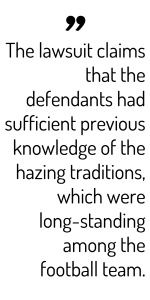Alleging the Baltimore School District uses a funding formula that violates the laws of Maryland, a group of charter schools has brought suit in Circuit Court. Moreover, the lawsuit as filed claims the district’s actions negatively impact the schools’ ability to serve thousands of their students.
 Dainique Dolly, a principal of one of the charter schools, stated, “We were hoping it would not come to this, but we’ve reached a point where we have to stand up for our children and families.” There are a total of eight charter schools listed in the lawsuit. These schools serve collectively at least 3,600 of the 13,700 students who are enrolled in charter schools in the district. This group also includes some of the schools considered as the highest-performing among all schools in the city.
Dainique Dolly, a principal of one of the charter schools, stated, “We were hoping it would not come to this, but we’ve reached a point where we have to stand up for our children and families.” There are a total of eight charter schools listed in the lawsuit. These schools serve collectively at least 3,600 of the 13,700 students who are enrolled in charter schools in the district. This group also includes some of the schools considered as the highest-performing among all schools in the city.
According to the charter funding complaint, a proposed new funding formula would significantly hurt the economic survivability of the schools. The group claims the change is a violation of the contractual obligations of the city and would leave them unable to pay for teachers, books and other expenses.
City school leadership expressed dismay over the filing of the lawsuit, indicating they had hoped for additional discussion on the matter. Although they had not reviewed the documents the officials said they saw the new proposal as a way to “refine a model that ensures continuation of commensurate funding for all students and schools — charters and non-charters.”
Dolly responded that her group viewed the anticipated action from another perspective. She opined that the school district was “backsliding from a more transparent system, where funds follow children to the classroom, to the old ways of controlling dollars and centralized decisions.”
The controversy arises over the interpretation of the intent and literal meaning of state funding laws and formulas. According to the numbers, the district now spends about $15,000 per student per year. This includes direct allocations (totaling $9,387 in 2014) and services provided by the district. The literal interpretation of the funding formula would have the district providing approximately $13,000 to the charter schools for each student. The district contends this amount is neither practical nor sustainable.
It now appears that repeated failures at efforts at mediate the issue will now require the courts to sort it out.



 Kessler had come to New York specifically to participate in the movement that originated near the financial center of the city. She claimed that she was protesting properly and following the instructions of the officers involved. However, she says she was arrested without cause, with one officer pulling her by her hair.
Kessler had come to New York specifically to participate in the movement that originated near the financial center of the city. She claimed that she was protesting properly and following the instructions of the officers involved. However, she says she was arrested without cause, with one officer pulling her by her hair.
 Lawsuit Overview
Lawsuit Overview
 The CTA describes the hit-and-run vehicle as a blue sedan operated by a male driver, though no suspects for the hit-and-run have been identified since the accident. The CTA bus driver who was said to be following the blue sedan at the time, Frankie Myles, was not charged with any criminal offenses or given a traffic ticket, but retired a few short years after the incident. Although the CTA holds firm to its assertion that Gonzalez was struck accidentally following the initial fatal hit-and-run, CTA president Dorval Carter Jr. has explained that the board feels that making the large settlement payment is the best option to not only avoid the unknowns and higher judgments of proceeding to court, but also to simply and swiftly put to rest a legal issue that is emotionally difficult and potentially stressful for all parties affected by the tragedy.
The CTA describes the hit-and-run vehicle as a blue sedan operated by a male driver, though no suspects for the hit-and-run have been identified since the accident. The CTA bus driver who was said to be following the blue sedan at the time, Frankie Myles, was not charged with any criminal offenses or given a traffic ticket, but retired a few short years after the incident. Although the CTA holds firm to its assertion that Gonzalez was struck accidentally following the initial fatal hit-and-run, CTA president Dorval Carter Jr. has explained that the board feels that making the large settlement payment is the best option to not only avoid the unknowns and higher judgments of proceeding to court, but also to simply and swiftly put to rest a legal issue that is emotionally difficult and potentially stressful for all parties affected by the tragedy.
 The Supreme Court has affirmed a right to educational access in Brown vs, Board of Education (1954). Students with disabilities also have rights grounded in the
The Supreme Court has affirmed a right to educational access in Brown vs, Board of Education (1954). Students with disabilities also have rights grounded in the 
 The pursuit of a quality education is not without restriction, especially when it comes to the separation between church and state. This fundamental principle is a part of the Nevada and U.S. constitutions and has stirred controversy since the inception of the United States. Case-in-point, the American Civil Liberties Union challenged Nevada’s education voucher system in mid-2015, taking issue with public funds being used for education at religious schools.
The pursuit of a quality education is not without restriction, especially when it comes to the separation between church and state. This fundamental principle is a part of the Nevada and U.S. constitutions and has stirred controversy since the inception of the United States. Case-in-point, the American Civil Liberties Union challenged Nevada’s education voucher system in mid-2015, taking issue with public funds being used for education at religious schools.
 While keyless ignition systems has not become standard, it is a coveted feature that is being offered and found on many vehicles today, regardless of class or price. The technology is simple. Instead of using a car key, you press a button to start your vehicle. A key fob component sends a computerized signal to the ignition omitting the need for an actual key. The inherent hazard is that the car can remain on though the key fob is not present and may be far away.
While keyless ignition systems has not become standard, it is a coveted feature that is being offered and found on many vehicles today, regardless of class or price. The technology is simple. Instead of using a car key, you press a button to start your vehicle. A key fob component sends a computerized signal to the ignition omitting the need for an actual key. The inherent hazard is that the car can remain on though the key fob is not present and may be far away.
 Recently, hackers made waves online when they managed to obtain and publish the private information of thousands of accounts on AshleyMadison.com, a Toronto-based website that purports to assist users in having an affair. Though many have since expressed a view of the hack as the well-deserved punishment of errant partners, Two Canadian law firms have a slightly different take. Charney Lawyers and Sutts, Strosberg LLP have filed a class-action lawsuit on behalf of Canadian Ashley Madison customers whose information was released, arguing that the hack was a breach of not just data, but intensely personal and sensitive information that could damage thousands of reputations and businesses.
Recently, hackers made waves online when they managed to obtain and publish the private information of thousands of accounts on AshleyMadison.com, a Toronto-based website that purports to assist users in having an affair. Though many have since expressed a view of the hack as the well-deserved punishment of errant partners, Two Canadian law firms have a slightly different take. Charney Lawyers and Sutts, Strosberg LLP have filed a class-action lawsuit on behalf of Canadian Ashley Madison customers whose information was released, arguing that the hack was a breach of not just data, but intensely personal and sensitive information that could damage thousands of reputations and businesses.
 The member, 48-year-old Yvette Cormier, noticed a transgender woman in the Midland Planet Fitness locker room in late February, and began to warn other gym members that “a man” was using the women’s locker room. When Cormier took her concerns to the front desk, she was told that the individual identifies as a woman. Unsatisfied, Cormier escalated her concerns to the corporate level, only to be met with one of the company’s regular slogans: Planet Fitness is a “no judgment zone.” Yvette Cormier says she then cancelled her membership and sought legal action. Cormier and her lawyer filed a complaint, charging that the Planet Fitness policy regarding transgender individuals puts women and children at risk, and encourages “possible criminal activity, including potential indecent exposure, disturbing the peace, and child abuse criminal actions.”
The member, 48-year-old Yvette Cormier, noticed a transgender woman in the Midland Planet Fitness locker room in late February, and began to warn other gym members that “a man” was using the women’s locker room. When Cormier took her concerns to the front desk, she was told that the individual identifies as a woman. Unsatisfied, Cormier escalated her concerns to the corporate level, only to be met with one of the company’s regular slogans: Planet Fitness is a “no judgment zone.” Yvette Cormier says she then cancelled her membership and sought legal action. Cormier and her lawyer filed a complaint, charging that the Planet Fitness policy regarding transgender individuals puts women and children at risk, and encourages “possible criminal activity, including potential indecent exposure, disturbing the peace, and child abuse criminal actions.”